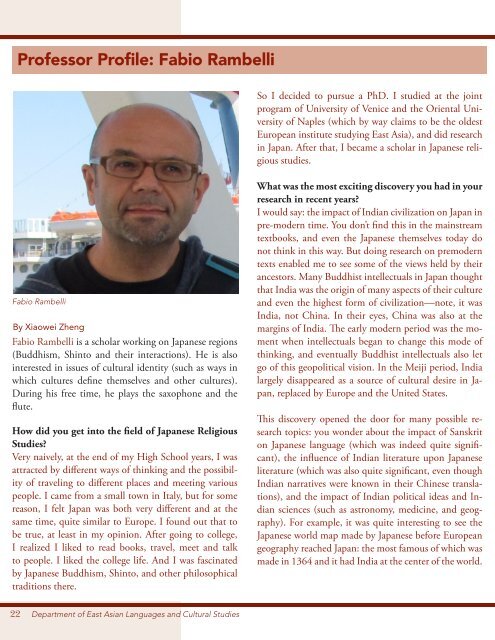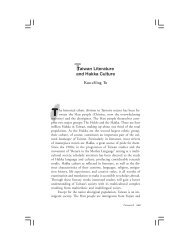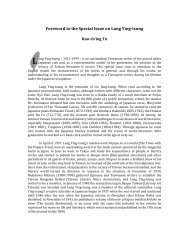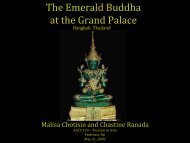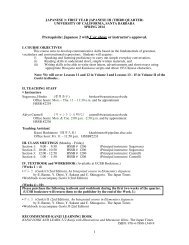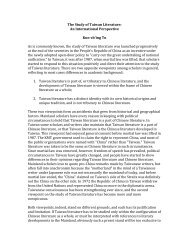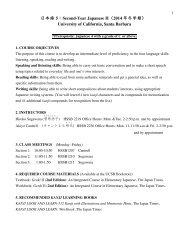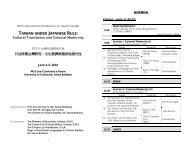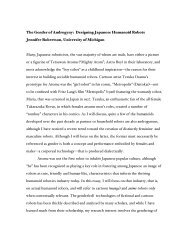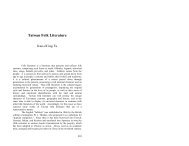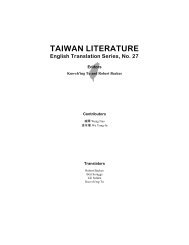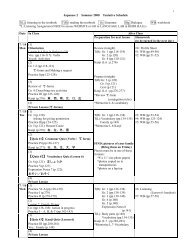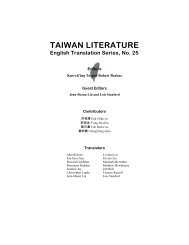History - Department of East Asian Languages and Cultural Studies
History - Department of East Asian Languages and Cultural Studies
History - Department of East Asian Languages and Cultural Studies
You also want an ePaper? Increase the reach of your titles
YUMPU automatically turns print PDFs into web optimized ePapers that Google loves.
Pr<strong>of</strong>essor Pr<strong>of</strong>ile: Fabio Rambelli<br />
Fabio Rambelli<br />
By Xiaowei Zheng<br />
Fabio Rambelli is a scholar working on Japanese regions<br />
(Buddhism, Shinto <strong>and</strong> their interactions). He is also<br />
interested in issues <strong>of</strong> cultural identity (such as ways in<br />
which cultures define themselves <strong>and</strong> other cultures).<br />
During his free time, he plays the saxophone <strong>and</strong> the<br />
flute.<br />
How did you get into the field <strong>of</strong> Japanese Religious<br />
<strong>Studies</strong>?<br />
Very naively, at the end <strong>of</strong> my High School years, I was<br />
attracted by different ways <strong>of</strong> thinking <strong>and</strong> the possibility<br />
<strong>of</strong> traveling to different places <strong>and</strong> meeting various<br />
people. I came from a small town in Italy, but for some<br />
reason, I felt Japan was both very different <strong>and</strong> at the<br />
same time, quite similar to Europe. I found out that to<br />
be true, at least in my opinion. After going to college,<br />
I realized I liked to read books, travel, meet <strong>and</strong> talk<br />
to people. I liked the college life. And I was fascinated<br />
by Japanese Buddhism, Shinto, <strong>and</strong> other philosophical<br />
traditions there.<br />
22 <strong>Department</strong> <strong>of</strong> <strong>East</strong> <strong>Asian</strong> <strong>Languages</strong> <strong>and</strong> <strong>Cultural</strong> <strong>Studies</strong><br />
So I decided to pursue a PhD. I studied at the joint<br />
program <strong>of</strong> University <strong>of</strong> Venice <strong>and</strong> the Oriental University<br />
<strong>of</strong> Naples (which by way claims to be the oldest<br />
European institute studying <strong>East</strong> Asia), <strong>and</strong> did research<br />
in Japan. After that, I became a scholar in Japanese religious<br />
studies.<br />
What was the most exciting discovery you had in your<br />
research in recent years?<br />
I would say: the impact <strong>of</strong> Indian civilization on Japan in<br />
pre-modern time. You don’t find this in the mainstream<br />
textbooks, <strong>and</strong> even the Japanese themselves today do<br />
not think in this way. But doing research on premodern<br />
texts enabled me to see some <strong>of</strong> the views held by their<br />
ancestors. Many Buddhist intellectuals in Japan thought<br />
that India was the origin <strong>of</strong> many aspects <strong>of</strong> their culture<br />
<strong>and</strong> even the highest form <strong>of</strong> civilization—note, it was<br />
India, not China. In their eyes, China was also at the<br />
margins <strong>of</strong> India. The early modern period was the moment<br />
when intellectuals began to change this mode <strong>of</strong><br />
thinking, <strong>and</strong> eventually Buddhist intellectuals also let<br />
go <strong>of</strong> this geopolitical vision. In the Meiji period, India<br />
largely disappeared as a source <strong>of</strong> cultural desire in Japan,<br />
replaced by Europe <strong>and</strong> the United States.<br />
This discovery opened the door for many possible research<br />
topics: you wonder about the impact <strong>of</strong> Sanskrit<br />
on Japanese language (which was indeed quite significant),<br />
the influence <strong>of</strong> Indian literature upon Japanese<br />
literature (which was also quite significant, even though<br />
Indian narratives were known in their Chinese translations),<br />
<strong>and</strong> the impact <strong>of</strong> Indian political ideas <strong>and</strong> Indian<br />
sciences (such as astronomy, medicine, <strong>and</strong> geography).<br />
For example, it was quite interesting to see the<br />
Japanese world map made by Japanese before European<br />
geography reached Japan: the most famous <strong>of</strong> which was<br />
made in 1364 <strong>and</strong> it had India at the center <strong>of</strong> the world.


